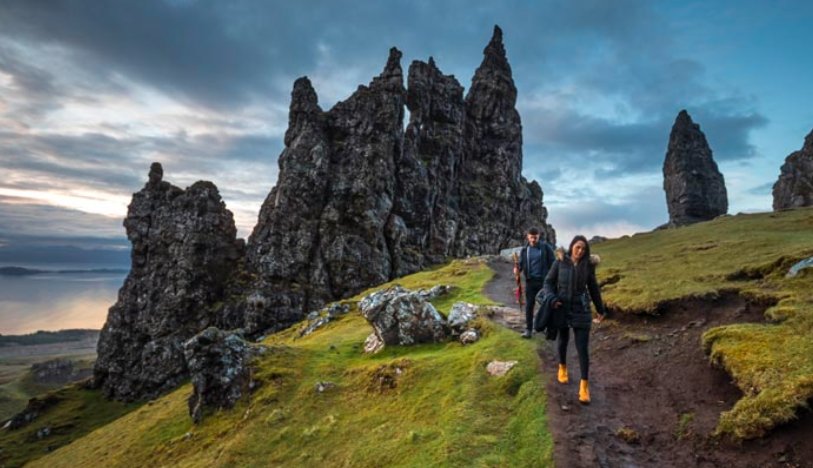How a national shift toward responsible tourism is shaping the visitor economy and redefining the travel experience
Scotland’s rugged landscapes, storied castles, and warm hospitality have long drawn millions of visitors from across the globe. But as footfall grows, so does the responsibility to ensure tourism leaves a legacy not just of memories—but of care, preservation, and positive impact.
Now, a bold new chapter is unfolding.
Scotland is placing responsible tourism at the centre of its visitor economy strategy—with a renewed commitment to sustainability, community benefit, and long-term business resilience. The goal is to position the country as not only a must-visit destination, but a must-return, year-round one—where visitors connect meaningfully with place, people, and purpose.
A New Support Model for a Changing Industry
At the heart of this vision is a free-to-access Business Support Hub, designed to guide tourism and events businesses through the practical steps of embedding sustainability into their operations.
The new hub marks a key shift: not just what Scotland offers, but how it supports those shaping its future.
“Businesses play a vital role in shaping responsible growth,” the programme’s leadership notes. “They ensure visitors can enjoy Scotland’s wonders while minimising environmental impact and supporting local communities.”
Through the hub, operators can access guidance on:
-
Reducing carbon emissions and managing waste
-
Promoting local cultural heritage
-
Fostering inclusive, positive visitor experiences
-
Designing low-carbon, community-centred itineraries
This is all part of a digital-first—but not digital-only model. It reflects a broader strategic shift underpinned by public service reform, real-time data, and behavioural insights—ensuring support is both agile and impactful.

Tourism That’s Good for the Soul
Scotland’s campaign message—Good for the Soul—is more than marketing. It signals a recalibration of priorities toward meaningful, values-driven travel.
Insights show that modern travellers are increasingly aware of their impact—both on the planet and their own wellbeing. Nature-based and regenerative tourism is one of the fastest-growing segments in Europe, and Scotland is leaning into that advantage with intention.
“We’re seeing a clear trend toward slow, mindful travel,” says one programme lead. “Visitors want to walk, not rush. Listen, not just look. And they want to leave a place better than they found it.”
From misty glens to wind-whipped coastlines, Scotland offers a natural canvas for such experiences. The challenge is connecting visitors to those opportunities while ensuring the benefits are mutual—reaching rural communities, protecting habitats, and sustaining the very culture that draws people here in the first place.
Backing Local, Building Resilience
In that spirit, Scotland continues to steward the Rural Tourism Infrastructure Fund—a flagship initiative aimed at relieving pressure on high-traffic beauty spots and enhancing rural visitor infrastructure.
Since its launch in 2018:
-
£20 million has been invested in 75 rural projects
-
An additional £16 million has been leveraged in co-funding
-
Projects have ranged from parking and toilet facilities to path upgrades and signage—improving access while protecting sensitive landscapes
But this is just one piece of the broader puzzle.
Scotland’s new strategy seeks to align economic growth with environmental stewardship—ensuring that small businesses, local artisans, and off-the-beaten-path communities benefit from visitor spend and story-sharing.
To amplify this, Scotland is working closely with global sustainability pioneers such as:
-
The Travel Corporation
-
The Travel Foundation
-
Tourism Cares
These collaborations are aimed at embedding global best practices into local contexts—helping Scottish businesses understand not just the moral case, but the commercial value of sustainability.
Looking Ahead: A Thriving, Responsible Visitor Economy
Scotland’s transition isn’t just timely—it’s strategic.
As travel rebounds post-pandemic and consumers become more discerning, the country has a chance to lead on what the future of tourism should look like: ethical, inclusive, regenerative, and community-rooted.
What’s emerging is a refreshed model where visitors are not passive consumers but conscious participants—where businesses are not merely hosts, but stewards of place—and where tourism becomes a force for good.
With climate concerns rising and cultural heritage under pressure, the stakes have never been higher. But with initiatives like the Business Support Hub, the Rural Tourism Infrastructure Fund, and an ever-stronger network of partners, Scotland appears poised to meet the moment.
Not by doing more—but by doing it better.


















